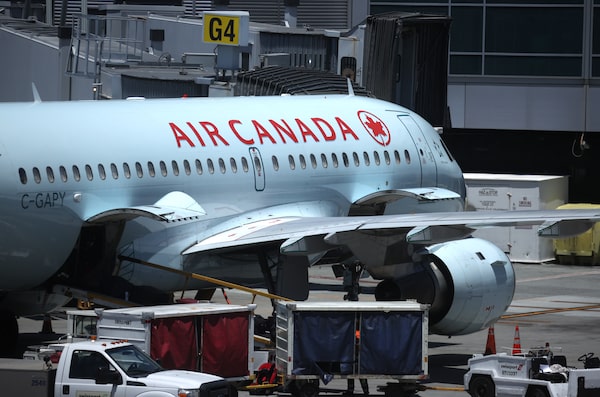
An Air Canada plane sits parked at the gate at San Francisco International Airport on June 30, 2020 in San Francisco, California.Justin Sullivan/Getty Images
Air Canada chief executive officer Calin Rovinescu renewed his attacks on government-imposed travel restrictions and the lack of a taxpayer bailout as Canada’s largest carrier unveiled a $1.7-billion second-quarter loss on Friday.
Mr. Rovinescu said the Montreal-based airline needs Ottawa to provide financial aid and/or loosen pandemic-related travel bans he blames for the prolonged drought in airfares. “It should be one or both, but it cannot be neither,” Mr. Rovinescu said on a conference call with analysts on Friday.
The federal government says Canadians should avoid nonessential travel to prevent catching or spreading COVID-19, which has killed 8,933 Canadians. Canada has closed its borders to most foreign travellers and requires anyone entering Canada to quarantine for 14 days, with a few exceptions. Some provinces have also imposed their own restrictions on visitors.
“Until the virus is controlled everywhere, life cannot go back to normal anywhere,” Dr. Theresa Tam, Canada’s Chief Public Health Officer, said in a statement on July 30.
Air Canada suffered its quarterly loss as the pandemic and a lack of demand for travel forced Canada’s largest airline to ground planes, lay off thousands and slash passenger capacity by 92 per cent.
Revenue fell by 89 per cent to $527-million in the three months ending June 30, from $4.7-billion in the year-ago period, Air Canada said on Friday.
Lucie Guillemette, Air Canada’s chief commercial officer, said the airline is monitoring global travel restrictions and is slowly adding routes. The airline will fly to 91 destinations this summer, twice May’s number but half of that a year ago, Ms. Guillemette said. “For the first time ever, our cargo revenue exceeded passenger revenue in the quarter.”
Mr. Rovinescu said a recovery in demand for airfares to pre-COVID-19 levels will take at least three years. Air Canada will emerge from the crisis a smaller airline with fewer planes and employees serving a reduced number of destinations and routes.
Air Canada said it increased its cost-cutting target by $500-million to $1.3-billion, retiring 79 planes, closing regional airport operations and reducing its work force by 20,000 people – more than half its staff – through layoffs, retirement and leaves. The company has tapped the federal government’s 75-per-cent wage subsidy for idled workers, and will use it through December, 2020.
Mr. Rovinescu told analysts that the airline will make more cuts as needed, including route deletions and suspensions, and the possible cancellation of orders for Boeing and Airbus planes.
Talks with the federal government about an airline-specific aid package are “active,” Mr. Rovinescu said, without providing details. He said most of Air Canada’s large privately owned foreign rivals have received some sort of government bailout, while enjoying fewer restrictions on travel. He said the stay-home orders governments issued in March at the onset of the pandemic in Canada were sensible, but can be eased now.
“Other parts of the world have also had a more rational, I would say, science-based approach to opening markets,” he said.
Finance Minister Bill Morneau’s office and the Department of Finance referred requests for comments to the office of Marc Garneau, Transport Minister.
Livia Belcea, a spokeswoman for Mr. Garneau, said the government will continue to talk with airlines and monitor the effect of the pandemic on the carriers, but did not provide details of any aid being discussed.
“COVID-19 has led to an unprecedented health and economic crisis – and our absolute priority is the health and safety of Canadians,” Ms. Belcea said in an e-mail. “Minister Garneau recognizes the impact COVID-19 is having on the air sector and understands that airlines are facing significant challenges.”
Meanwhile, Mr. Rovinescu said Air Canada’s proposed purchase of Transat AT Inc. for $720-million is before Canadian regulators, and a European probe of the deal has been halted in Europe as regulators there await updates from the companies.
Transat has twice extended the deal’s closing date, “which ultimately cannot extend beyond Dec. 22, 2020,” Mr. Rovinescu said. Transat shares are trading well below the offer price, raising questions about the deal’s fate.
Your time is valuable. Have the Top Business Headlines newsletter conveniently delivered to your inbox in the morning or evening. Sign up today.
 Eric Atkins
Eric Atkins